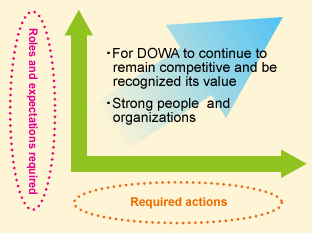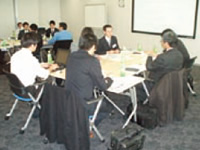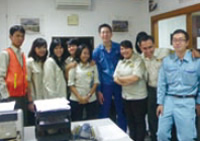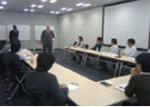The DOWA group tries to maintain an appropriate number of employees, considering the present status of number of employees and our growth plan. As of March 31, 2011 we have total 4,511 employees of which 4,057 employees (90%) are male and 454 employees (10%) are female. The number of temporary workers including contract employees, non-regular staff and dispatched workers is 1,554.
Employment status (persons)
| Number of employees at the year end | Number of male and female employees | |||
|---|---|---|---|---|
| Management | Regular employees | Male | Female | |
| In Japan | 670 | 2,924 | 3,299 | 295 |
| Outside Japan | 111 | 806 | 758 | 159 |
| Non-regular and temporary basis | Dispatched employees |
|---|---|
| 973 | 420 |
| 154 | 7 |
DOWA’s human resource system is operated, based on the role and qualification grade system. In 2010, we renewed the criteria of our role grades that are the basis of the system. The criteria show DOWA’s expectations and actions to member companies in order for DOWA to continue to remain competitive and recognized for its value. We tried to discuss which criterion should be renewed among employees in a workshop style to make the renewed criteria very specific and concrete.
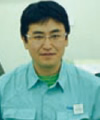
Yuzuru Hisae, the Commercialization Promotion Office, DOWA Electronics
Participation in workshop
Workshop with members from different business areas offered me a good opportunity to gain understanding of changes in our business structure and surrounding environment. We tried to discuss issues as specific and concrete as possible and in the process our communication abilities were tried. Let’s encourage useful operation of the renewed criteria to make our company more attractive and enjoyable. (Proposals for improvement are always welcome.)
In connection with the introduction of the new system, we also reviewed our employee evaluation system, ability development system and relevant initiatives.
We continue to improve the system, aimed at fostering competitive human resources and vitalizing our organizations while observing the operational statuses of the system and identifying issues by conducting surveys on a regular basis.
The DOWA group’s work/life balance aims at helping each employee to exercise his/her abilities to the greatest extent according to his/her life style both at work and at home. We strive to improve the working environment by implementing a more flexible working system like flexible working hours and leave of absence system for raising children and caretaking of family members.
In 2010, six female employees took child-raising leaves of absence.
We will continue our work life balance efforts, based on the action plan to nurture the next generation that was prepared in 2009.
Child-raising leave of absence
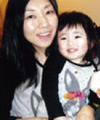
Mizuho Ito (with her daughter Yuka), Akita Local Center, DOWA Management Service
As this was the first child raising experience for me, one year passed faster than I had imagined, I was busy with taking care of my daughter from morning till night during the absence leave of child-raising. Despite the hectic days, I was glad to be able to be always together with her, which was such a valuable time for me.
I was not sure whether I could go back to my work after one year’s absence, but my colleagues are really considerate and willing to cover my job in case I have to take emergency leave of absence during the leave of child-raising and after I returned to my workplace. I am very grateful that I can work at such a wonderful workplace. I work full time after one year of leave of absence for child-raising. I'm now working hard to find out how effectively I can complete my job within working hours.
I would like to treasure every day, thanking for my colleagues and my family who always extend cooperation. [She returned to work in January 2011 after one year of leave of absence for child-raising]
The DOWA group is actively promoting employee education, aimed at enhancing the power of the field force that can contribute to cultivating a corporate climate to foster and develop human resources who can play an important role in global markets.
Among others, the skill improvement initiative is very important to position DOWA as technology-oriented company and remain competitive in international markets. The initiative can strengthen the DOWA group’s basic system to foster human resources continuously in each field of business. We made a presentation at the end of 2010 to promote and improve this initiative horizontally across the group.
We will continue to support DOWA’s manufacturing forefront not only through presentations but also by continuing these initiatives in combination with various human resource systems including the role and qualification grade criteria.
DOWA Eco-system enhances education of globally-oriented human resources through its unique programs. DOWA’s programs are aimed at development of leaders who have a global view and can contribute to increasing corporate value and improving the levels of our employees as part of our efforts responding to our rapid global deployment.
Overseas Training of Newly Recruited Employees
We dispatch newly recruited employees who have stayed with DOWA for three years to our overseas sites for training so that they can learn about the international business of their own company and develop international view through on the job training and human exchange programs. We also set up a training program for brushing up their language and presentation skills. They are assigned to make a presentation in English on the fast day of training and also after they return to Japan and answer questions.
1. To be able to communicate in English, learn the difference between Japan and other countries and experience different cultures through an overseas stay
2. To understand business operations of each company and environmental business situation of each country
3. To discover the difference between Japanese companies and companies in other countries, identify which points should be improved and make use of the results in actual business activities

Through the training this year, I had a very affirmative experience of staying abroad and was able to identify my strengths and weaknesses of living abroad. In addition, my experience of different business environment from that in Japan and new values made me discover many things which I had not seen before. I would like to make use of this experience in contributing to environmental reclamation in Asian countries in the near future.
Shunsuke Yoshi, Osaka Sales Office, Geotech Business Unit, DOWA Eco-system
Cross-cultural Exchange Program
This program is a one-day class given by professionals to give some insights into solutions for communicating with foreigners. In this program, participants learn the background of the difference between Japanese and foreigners and also what kind of communication gaps are created by cultural differences, while they are encouraged to speak up more aggressively.
To enhance skills to cope with interaction with local people abroad and overseas business activities smoothly

Employees who are assigned to work abroad will often be assigned later as the head of an office or a company, or mid-career managers. Therefore, ability to communicate with employees abroad is a prerequisite to them and they must overcome the difference of languages. Smooth communication, understanding and respect for mutual cultures are of importance in globalization of enterprises.
Toru Nishiyama, Chairman and President, DOWA Shuzhou
The DOWA group continues to offer educational programs on health and safety of workplace to employees and those of partner companies to raise awareness and prevent accidents. We also offer study sessions on risk assessment and accident cases in addition to various training and educational programs, especially in production-related departments where environmental and safety education is prerequisite.
In 2010 under the idea that “safety must be seen from the eyes of others”, we conducted 1) safety patrols by relevant parties of the companies of the DOWA group, 2) offered “Safety Environmental Compliance Training” sessions to study compliance from the environmental and anti-pollution point of view, combined with ISO14001 and 3) introduced a “Danger Education through Experience” targeted for field maintenance personnel and young engineers.

Aiming at making a safer and more comfortable working environment, we set up the DOWA Hotline Desk and advertise the desk through in-house posters. The DOWA Hotline Desk is open even for customers and partners so that we can build up sound relations with outside our company.

